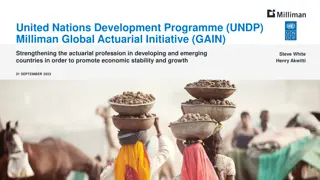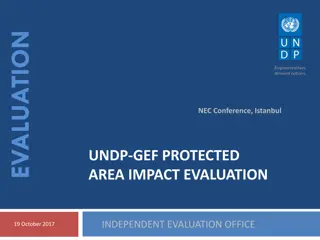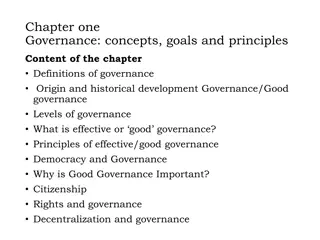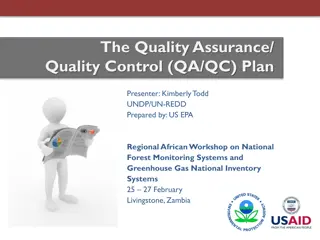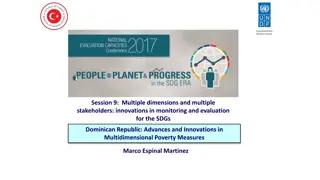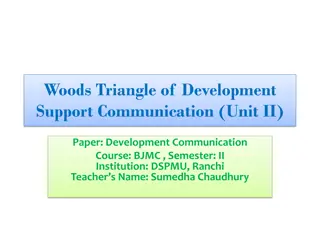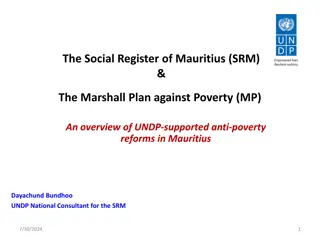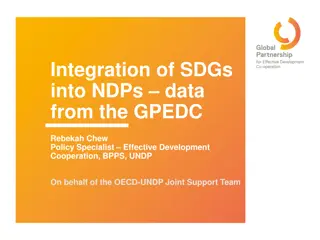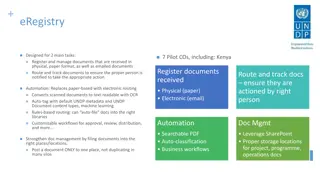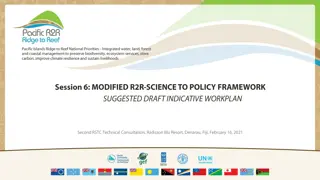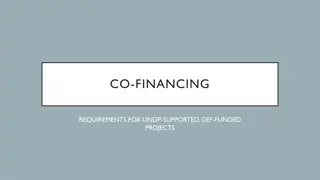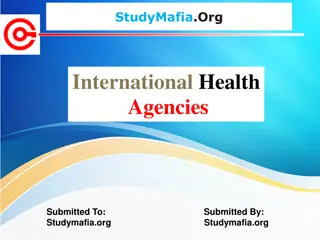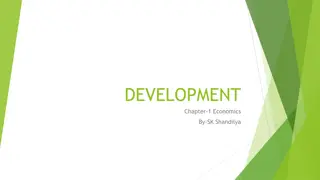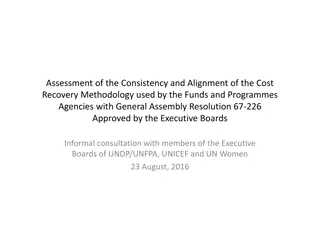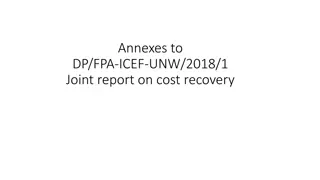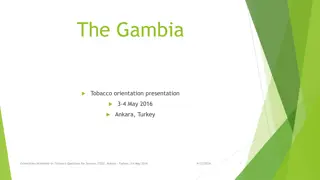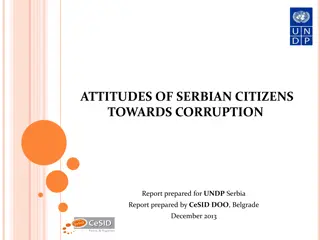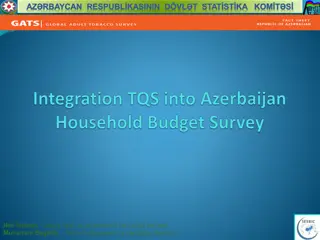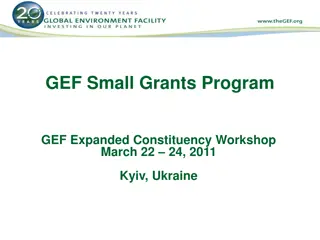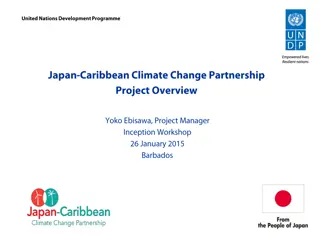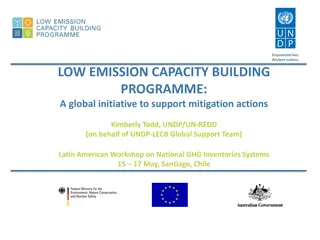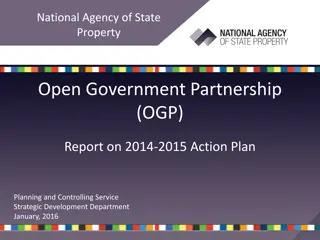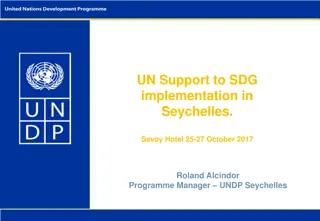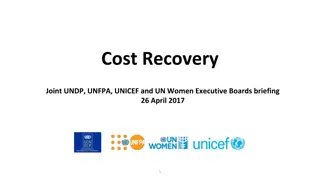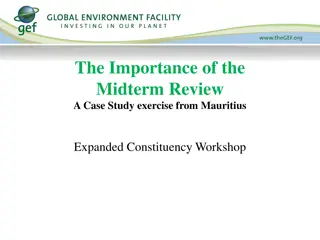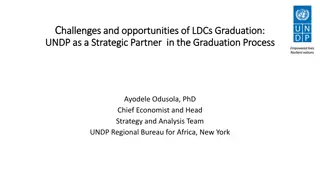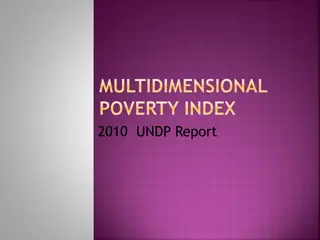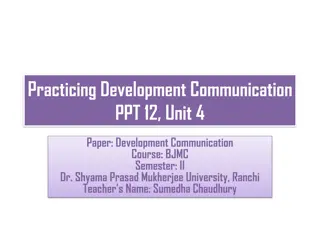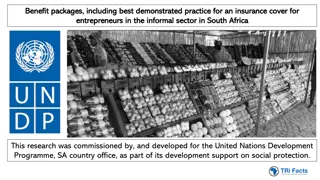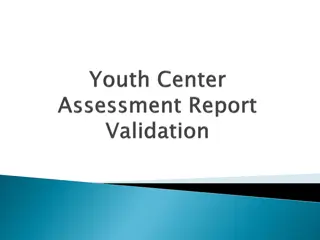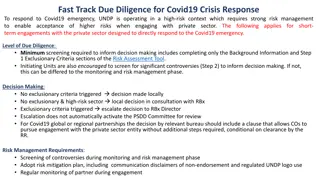Milliman Global Actuarial Initiative (GAIN)
The United Nations Development Programme (UNDP) and Milliman Global Actuarial Initiative (GAIN) are working together to enhance the actuarial profession in developing nations, fostering economic stability, and growth. The initiative aims to promote risk protection mechanisms through insurance contri
5 views • 27 slides
Impact Evaluation of Protected Areas and Biodiversity Conservation Projects
This evaluation focuses on the impact of UNDP-GEF supported Protected Areas (PAs) across 137 countries since 1992. It includes analysis of forest change, species population, human interaction with PAs, capacity trends, and governance. The portfolio analysis covers 618 projects with over $12.3 billio
0 views • 12 slides
Understanding Governance: Concepts, Principles, and Importance
Governance encompasses decision-making processes involving stakeholders, impacting how people lead their lives. Various definitions from organizations like the World Bank and UNDP highlight governance as how authority is exercised, resources managed, and citizens participate in decision-making. Good
2 views • 158 slides
Understanding Quality Assurance and Quality Control in Inventory Development
This presentation by Kimberly Todd for UNDP/UN-REDD focuses on the importance of Quality Assurance (QA) and Quality Control (QC) plans in inventory work. It covers the purpose, overview, QA/QC components, and the differences between QA and QC. The content emphasizes the need for systematic review an
0 views • 18 slides
Innovations in Multidimensional Poverty Measures in the Dominican Republic
Explore the advancements in poverty measurement through a presentation focusing on the adoption of multidimensional poverty indices in the Dominican Republic. The session delves into various poverty measures used, including the Multidimensional Poverty Index (MPI) by UNDP, highlighting the country's
0 views • 22 slides
Enhancing Evaluation Capabilities in Mongolia for Agenda 2030
The Mongolian Evaluation Network in collaboration with UNDP is working to integrate the 2030 Agenda into national strategies and plans, establish institutional coordination mechanisms, align budgets, and enhance data monitoring systems. Key stakeholders including government agencies, NGOs, and inter
0 views • 9 slides
Understanding Woods Triangle of Development Support Communication
John L. Woods introduced the concept of Woods Triangle, emphasizing the interconnection between knowledge generators, political leaders, and development knowledge users. Development Support Communication, popularized by UNICEF and UNDP, plays a crucial role in linking various stakeholders involved i
6 views • 5 slides
Overview of Social Register of Mauritius and Marshall Plan against Poverty Reforms
The Social Register of Mauritius (SRM) is a crucial tool for registering and identifying the poor, aiding policy-makers in creating effective pro-poor policies. This overview of UNDP-supported anti-poverty reforms in Mauritius highlights the objectives and improvements brought about by SRM, addressi
0 views • 30 slides
Integration of SDGs into NDPs: GPEDC Data Analysis by Rebekah Chew
Explore the integration of Sustainable Development Goals (SDGs) into National Development Plans (NDPs) through data insights from the Global Partnership for Effective Development Co-operation (GPEDC). Rebekah Chew, a Policy Specialist at the BPPS, UNDP, presents key information on aligning country p
0 views • 15 slides
Streamlining UNDP Document Management with eRegistry Automation
Revolutionize document processing at UNDP with eRegistry Automation, a robust system designed to streamline tasks such as document registration, routing, tracking, and classification. By automating tedious processes and enabling easy searchability, eRegistry enhances efficiency and accuracy in docum
0 views • 5 slides
GEF Ridge to Reef Programme for Sustainable Development in Pacific Islands
The GEF Ridge to Reef Programme, a collaborative effort by UNDP, FAO, and UNEP, aims to support the strategic investment for sustainable development in Pacific Islands through integrated environmental and natural resource management. Challenges such as the COVID-19 outbreak and limited local experti
0 views • 6 slides
Understanding Co-Financing Requirements for UNDP-Supported, GEF-Funded Projects
Co-financing for GEF-financed projects refers to additional resources provided by the GEF Partner Agency or other non-GEF sources to support project implementation and goals. The sources of co-financing include various entities such as bilateral aid agencies, foundations, governments, civil society
0 views • 8 slides
Role of International Health Agencies in Improving Global Healthcare
International health agencies play a crucial role in providing assistance to enhance medical care in developing countries. They offer expert advice, training, and resources to local health professionals, contributing significantly to healthcare delivery systems worldwide. Key agencies like WHO, UNES
0 views • 19 slides
Overview of Development Economics and Goals
Development economics is a branch of economics that focuses on improving the economies of developing countries by targeting factors such as health, education, working conditions, and policies. It involves macroeconomic and microeconomic analysis to enhance domestic and international growth. Differen
1 views • 11 slides
Safeguards Information System Development in Zambia: Successes and Challenges
Zambia successfully implemented a Safeguards Information System (SIS) with the support of various partners and stakeholders. The process involved consultation, narrative reporting, and the creation of a web-based platform managed by the Forestry Department. While facing minimal challenges, ongoing i
0 views • 7 slides
M&E for REDD+ Implementation Stocktaking - UN-REDD Asia-Pacific
In this resourceful session by Bruno Hugel from UNDP in Bangkok, key aspects of Monitoring and Evaluation (M&E) for REDD+ implementation are covered, including developing results frameworks, setting up M&E systems, leveraging existing information systems, and integrating across all sub-systems for e
0 views • 5 slides
Assessment of Cost Recovery Methodology Alignment with General Assembly Resolution 67-226
This report assesses the consistency and alignment of the cost recovery methodology used by UNDP/UNFPA, UNICEF, and UN Women with General Assembly Resolution 67-226. Issues such as declining core funding, the need to avoid cross-subsidization, and the importance of full cost recovery are highlighted
0 views • 14 slides
A Handbook for Building National MPIs: Practical Guidance for Ending Poverty
This handbook provides detailed practical guidance on creating a technically rigorous permanent national Multidimensional Poverty Index (MPI). Jointly developed with UNDP, it aims to accelerate progress towards the Sustainable Development Goals by offering insights from countries' experiences in des
3 views • 18 slides
Report on Effective Cost Recovery Rates by UNDP for 2014-2017
The joint report on cost recovery by UNDP for the years 2014-2017 provides detailed evidence and analysis of the effective average cost recovery rates, compliance with cost recovery policy, and calculations based on financial information. The report highlights contributions from various sources, inc
1 views • 23 slides
Tobacco Questions for Surveys Workshop Overview in Ankara, Turkey
This presentation outlines the Orientation Workshop on 'Tobacco Questions for Surveys (TQS)' held in Ankara, Turkey. It covers topics such as tobacco data overview, smoking initiation among Gambian adolescents, survey methodologies, and the Integrated Household Survey (IHS). The workshop aimed to pr
0 views • 12 slides
UNDP Don't Choose Extinction Campaign Playbook & Assets for Social Channels
UNDP has launched the Don't Choose Extinction campaign with a comprehensive playbook and content calendar to support the initiative across social channels. The campaign includes assets, delivery schedules, platform guides, and regional alignment strategies, aiming to deliver a unified message to com
0 views • 19 slides
Citizen Attitudes Towards Corruption in Serbia: A 2013 Report
Report prepared by CeSID DOO for UNDP Serbia in December 2013 delves into Serbian citizens' attitudes towards corruption, financial situations, and key problems. Findings reveal a mixture of optimism and concern among citizens regarding the direction of the country, highlight financial struggles fac
0 views • 27 slides
Workshop on New Approaches to Statistical Capacity Development in Lao PDR
This workshop, hosted by PARIS21 and UNDP, focuses on enhancing statistical capacity development in Lao PDR. It covers topics like successful capacity development programs, partnerships for national statistics development, and prioritizing needs versus international requirements. The Lao Statistics
0 views • 15 slides
Socio-Economic Impact of Oil Prices on Poverty in Azerbaijan
According to the UNDP, Azerbaijan's Human Development Index has improved but challenges persist due to the economy's reliance on natural resources, impacting poverty levels. The country faces issues with currency devaluation affecting living standards. Efforts are being made to address poverty throu
1 views • 25 slides
Overview of GEF Small Grants Program in Kyiv, Ukraine
The Global Environment Facility (GEF) Small Grants Program in Kyiv, Ukraine, supports community-level initiatives addressing various environmental issues. Managed by UNDP, the program provides grants up to $50,000 USD, targeting vulnerable communities with limited capacity. Since 1992, over 13,000 p
0 views • 12 slides
Partnership Project Implementation Overview in CARICOM Region
An agreement between the Prime Minister of Japan and Heads of CARICOM Member States led to a project initiated in July 2014, aiming to benefit countries like Belize, Dominica, Grenada, Jamaica, and others. The project, managed by UNDP, involved multiple stakeholders and focused on various aspects su
0 views • 7 slides
Global Low Emission Capacity Building Programme Overview
The Low Emission Capacity Building Programme is a global initiative by UNDP aimed at enhancing capacities for designing and implementing Low Emission Development Strategies and national mitigation actions in various sectors. It includes components like GHG inventory management, NAMAs, LEDS, MRV, and
0 views • 12 slides
Evaluation of UNDP Support to Conflict-Affected Countries in Integrated Peace Operations
This evaluation conducted by the Evaluation Office of UNDP in May 2013 assesses how UNDP's programming supports peacebuilding in conflict-affected countries. It focuses on UNDP's role in transitioning countries from immediate post-conflict to development stages and evaluates the effectiveness of res
0 views • 12 slides
Enhancing Public Services through Open Government Partnership in Georgia
The National Agency of State Property in Georgia, in partnership with the Open Government Partnership (OGP) and supported by the United Nations Development Programme (UNDP), has undertaken a project to improve transparency, accountability, and citizen engagement in public services. The 2014-2015 Act
0 views • 9 slides
UNDP Support to SDG Implementation in Seychelles - Initiatives Overview
UNDP has been actively supporting the implementation of Sustainable Development Goals (SDGs) in Seychelles through various workshops, awareness campaigns, and strategic partnerships. Initiatives include prioritization workshops, integration of SDGs into national development, and launching a Creole b
1 views • 17 slides
Joint UNDP, UNFPA, UNICEF, UN Women Executive Boards Cost Recovery Briefing
Briefing on cost recovery for the joint Executive Boards of UNDP, UNFPA, UNICEF, and UN Women, covering topics such as feedback on cost recovery, role of core resources, cost recovery models using a LEGO approach, harmonization efforts, guidance for Executive Boards, and next steps towards proposing
0 views • 42 slides
Importance of Midterm Review in Mauritius Constituency Workshop
Examining the significance of the Midterm Review (MTR) in the context of a GEF-funded UNDP project in Mauritius focusing on biodiversity conservation. The MTR acts as a pivotal point for assessing project performance, catalyzing positive change, and informing stakeholders about achieved outcomes. Th
0 views • 16 slides
Challenges and Opportunities of LDCs Graduation: UNDP's Role
Overview of the challenges and opportunities faced by Least Developed Countries (LDCs) in the graduation process, highlighting the criteria, countries already graduated, and those scheduled for graduation. The presentation discusses the role of UNDP as a strategic partner in supporting LDCs through
0 views • 12 slides
Step-by-Step Guide for Job Classification Process
Follow these detailed steps to classify a job at GSSU PSA 2021. From accessing the International Civil Service Commission page to selecting UNDP account and filling post information, this guide will help you navigate through each essential stage for accurate job evaluation and classification. Make i
0 views • 9 slides
Understanding the Multidimensional Poverty Index (MPI)
The MPI, introduced in 2010 by OPHI and UNDP, offers a comprehensive view of poverty by considering various dimensions beyond just income. Unlike traditional measures, the MPI captures deprivations in fundamental services and human functioning. It addresses the limitations of monetary poverty measur
0 views • 56 slides
Development Communication Partnerships: A Collaborative Approach for Impact
Development communication partnerships, exemplified by the collaboration between the UNDP and the private sector, are crucial for addressing global challenges like climate change. By allowing authentic voices to speak on their behalf, organizations can amplify their impact and promote collective eff
0 views • 4 slides
Enhancing Insurance Coverage for Informal Sector Entrepreneurs in South Africa
This research commissioned by the UNDP SA country office aims to improve resilience for entrepreneurs in South Africa's informal sector, particularly women, by offering social protection through insurance coverage against income loss. The study underlines the vulnerability accentuated by the Covid-1
0 views • 14 slides
Capacity Assessment and Development Plan for Youth Centers in Liberia
The capacity assessment covered various youth centers across Liberia, focusing on organizational, technical, and institutional capacities. The methodology involved mobilizing stakeholders, conducting situational analyses, and developing a capacity development plan. Key findings highlighted governanc
0 views • 21 slides
Fast Track Due Diligence for Covid19 Crisis Response
UNDP is implementing a fast-track due diligence process for engaging with the private sector in response to the Covid19 crisis. The approach involves minimum screening requirements, local decision-making protocols, risk management measures, and guidelines for partnership activities. The operational
0 views • 4 slides
